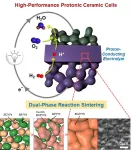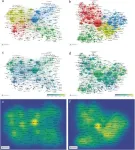(Press-News.org) Bethesda, Maryland - 10 October 2024. In a revealing Genomic Press Interview published on 10 October 2024, Dr. Carlos A. Zarate Jr., NIH Distinguished Investigator and pioneer in rapid-acting antidepressant research, offers a glimpse into the personal motivations and scientific breakthroughs that have defined his career. The interview, part of the journal's Innovators and Ideas series, showcases Dr. Zarate's journey from a young tennis instructor in Argentina to a leading figure in psychiatric research at the National Institute of Mental Health (NIMH).
Dr. Zarate's work has fundamentally altered the landscape of depression treatment, particularly through his team's groundbreaking research on ketamine. "The ultimate goal of all my research efforts is to develop better and safer treatments for our patients and alleviate the suffering of millions of individuals worldwide with mood disorders," Dr. Zarate states in the interview.
His research has demonstrated that ketamine, an NMDA receptor antagonist, can produce rapid and long-lasting antidepressant effects within hours, challenging the traditional paradigm of weeks-long wait times for antidepressant efficacy. This discovery has opened new avenues for understanding the neurobiology of depression and developing targeted, fast-acting treatments.
Dr. Zarate's innovative approach extends beyond the laboratory. He employs a bi-directional translational strategy, seamlessly integrating clinical, behavioral, and imaging technologies with basic science collaborations. This holistic method has led to numerous breakthroughs in mood disorders research, addressing critical issues such as treatment resistance and suicidal ideation.
The interview explores Dr. Zarate's current research focus, including a Phase 2 trial of a ketamine metabolite, (2R,6R)-HNK, which promises the rapid antidepressant effects of ketamine without its anesthetic or dissociative side effects. This development could potentially revolutionize depression treatment, offering a safer alternative with reduced risk of misuse.
Dr. Zarate's commitment to mentorship and collaboration shines through in the interview. "I really enjoy seeing [trainees] progress through their careers from training to independence," he shares. His emphasis on "Team Science" - involving universities, government, private foundations, industry, and advocacy groups - underscores the collaborative nature of transformative research in mental health.
The Genomic Press Interview also offers personal insights into Dr. Zarate's life philosophy and values. When asked about his greatest achievement, he points to "setting up the necessary systems and infrastructure to investigate current and future problems in psychiatric research." This response highlights his forward-thinking approach and dedication to advancing the field beyond his own contributions.
As the interview reveals Dr. Zarate's multifaceted approach to mental health research, several questions emerge for further exploration:
1. How might the success of rapid-acting antidepressants like ketamine reshape our understanding of mood disorders at a neurobiological level?
2. What potential applications could Dr. Zarate's research have for other areas of psychiatry, such as anxiety disorders or PTSD?
3. How can the "Team Science" approach be further leveraged to accelerate breakthroughs in mental health treatment?
Dr. Carlos A. Zarate Jr.’s Genomic Press interview is part of a larger series that highlights the people behind today’s most influential scientific ideas. Each interview in the series offers a blend of cutting-edge research and personal reflections, providing readers with a comprehensive view of the scientists shaping the future. By combining a focus on professional achievements with personal insights, this interview style invites a richer narrative that both engages and educates readers. This format provides an ideal starting point for profiles that delve into the scientist’s impact on the field, while also touching on broader human themes. More information on the research leaders and research rising stars featured by Genomic Press can be found in our website: https://genomicpress.com.
The full Genomic Press Interview, titled “Carlos A. Zarate, Jr.: Using clinical translational neuroscience to develop the next generation of antidepressant treatments that act more rapidly and effectively” is available on 10 October 2024 in Brain Medicine, offering readers an unparalleled opportunity to explore the thoughts and experiences of one of the most influential minds in mental health research. The article is freely available online at https://bm.genomicpress.com/aop/
About Brain Medicine: Brain Medicine (ISSN: 2997-2639) is a peer-reviewed journal published by Genomic Press, New York. Brain Medicine is a new home for the cross-disciplinary pathway from innovation in fundamental neuroscience to translational initiatives in brain medicine. The journal’s scope includes the underlying science, causes, outcomes, treatments, and societal impact of brain disorders, across all clinical disciplines and their interface.
END
Ketamine pioneer Dr. Carlos A. Zarate Jr. reshapes depression treatment landscape
Genomic Press Interview reveals personal journey and scientific breakthroughs of NIH Distinguished Investigator
2024-10-10
ELSE PRESS RELEASES FROM THIS DATE:
Glowing approach could aid carpal tunnel-related surgery
2024-10-10
In modern office life, avoiding the onset of carpal tunnel syndrome might be a daily struggle. The worst case could mean needing surgery to alleviate compression of the nerves or to repair damaged nerves. Helping surgeons visually check the areas where neural blood flow has decreased due to chronic nerve compression can lead to improvements in diagnostic accuracy, severity assessments, and outcome predictions.
With this in mind, an Osaka Metropolitan University-led research team involving Graduate School of Medicine student Kosuke Saito and Associate Professor Mitsuhiro Okada investigated the use of fluorescein angiography, a method employed in neurosurgery and ophthalmology ...
The hidden costs of free apps – more than personal data
2024-10-10
Procrastination, sleep deprivation and reduced focus are part of the price we pay for free mobile apps. This is according to researchers at Linköping University and RISE, who have investigated the costs hidden behind the free apps. Based on their results, they also have some advice for decision-makers.
Most of us are becoming aware that our digital attention is hard currency for companies like Google and Facebook. By analysing our digital behaviour patterns, they can target tailored advertising directly to our feeds. Our attention becomes the product that is sold to advertisers. For example, YouTube’s three billion monthly users generated ...
Hot dragonfly summer: species with darker wings have evolved to withstand heat and attract partners
2024-10-10
Temperature determines where species can live and if they are threatened by a warming climate. So, for a long time, biologists studied how heat tolerance affects survival. Yet, less is known about how thermal traits influence reproduction, which is directly linked to extinction risk.
Now, researchers in the US have examined if males of dragonfly species that produce sexual signals in the form of dark coloration on their wings are more resistant to heat. They published their results in Frontiers in Ethology.
“We show that dragonfly species that have evolved dark breeding coloration on ...
Development of a new electrolyte synthesis method for next-generation fuel cells: a step closer to green hydrogen production
2024-10-10
Dr. Ho-Il Ji from the Hydrogen Energy Materials Research Center at the Korea Institute of Science and Technology (KIST, President Sang-Rok Oh), along with Professor Sihyuk Choi's team from Kumoh National Institute of Technology, announced that they have developed a new synthesis method that can significantly reduce the sintering temperature required for the densification process of the electrolyte in next-generation high-efficiency protonic ceramic cells.
Existing solid oxide cells (SOC) can produce electricity in fuel cell operation and hydrogen in ...
Rage clicks: Study shows how political outrage fuels social media engagement
2024-10-10
A new Tulane University study explains why politically charged content gets more engagement from those who disagree. Researchers found a “confrontation effect,” where people are more likely to interact with content that challenges their views than those that align with them.
The study analyzed data from Twitter, Facebook, and online experiments over time, including during the 2020 U.S. presidential election, and found that users frequently react to opposing viewpoints with heightened engagement, often ...
E-waste experts urge public: Stop trashing electronic products with ordinary garbage (International E-Waste Day)
2024-10-10
To mark the upcoming International E-Waste Day, Oct. 14, consumers worldwide are urged to collect dead and/or unused electronics and electrical products and give them a second life through reuse or repair, or recycle them properly.
Above all: stop tossing them out in household waste bins.
The Global E-waste Monitor 2024, authored by UNITAR in cooperation with ITU, reported almost a quarter of end-of-life electronic waste ends up in home trash, squandering billions of dollars worth of copper, gold and other precious metals, materials critical to the production of such products, along with valuable plastics, and glass.
The 14 million tonnes of ...
Hospitals that are understaffed for infection prevention and control have higher rates of infection, study says
2024-10-10
Hospitals that are Understaffed for Infection Prevention and Control Have Higher Rates of Infection, Study Says
Nearly 4 in 5 hospitals are not staffed at sufficient level to keep patients safe from preventable infections
Arlington, Va. — October 10, 2024 — Inadequate infection prevention and control staffing levels are associated with higher rates of healthcare-associated infections, according to a new study published today in the American Journal of Infection Control.
The study, conducted by the APIC Center for Research, Practice & Innovation, summarizes a pilot project to evaluate a new online calculator aimed at providing facility-specific recommendations ...
Study reveals 85% of women prefer choice between self-sampling and traditional cervical screening
2024-10-10
A new study led by researchers at Queen Mary University of London reveals women would welcome the option to choose between self-sampling and traditional screening done by a nurse or doctor for human papillomavirus (HPV)-based cervical screening.
The study, published in the Journal of Medical Screening, assessed a group of 2,300 women aged 24-65 who had collected their own samples alongside having their standard cervical screening in 38 GP practices across England. Participants were asked about their screening preference and their attitudes toward being offered a choice between ...
Global advances and future trends in cervical cancer research from 2013 to 2022
2024-10-10
With ongoing advancements in cervical cancer research, the global scientific community has gained a more comprehensive understanding of this significant threat to women's health. A research team led by Professor Weimin Kong has recently published a paper titled "Hotspots and frontiers in cervical cancer research: a bibliometric and visualization analysis from 2013 to 2022" in the internationally renowned journal Malignancy Spectrum. The study systematically analyzed the development trends and research hotspots in global cervical cancer research over the past decade using bibliometric methods.
The research ...
Inspired by Spider-Man, a lab recreates web-slinging technology
2024-10-10
Every kid who has read a comic book or watched a Spider-Man movie has tried to imagine what it would be like to shoot a web from their wrist, fly over streets, and pin down villains. Researchers at Tufts University took those imaginary scenes seriously and created the first web-slinging technology in which a fluid material can shoot from a needle, immediately solidify as a string, and adhere to and lift objects.
These sticky fibers, created at the Tufts University Silklab, come from silk moth cocoons, which are boiled in solution and broken down into their building block proteins called fibroin. ...
LAST 30 PRESS RELEASES:
Why chronic pain lasts longer in women: Immune cells offer clues
Toxic exposure creates epigenetic disease risk over 20 generations
More time spent on social media linked to steroid use intentions among boys and men
New study suggests a “kick it while it’s down” approach to cancer treatment could improve cure rates
Milken Institute, Ann Theodore Foundation launch new grant to support clinical trial for potential sarcoidosis treatment
New strategies boost effectiveness of CAR-NK therapy against cancer
Study: Adolescent cannabis use linked to doubling risk of psychotic and bipolar disorders
Invisible harms: drug-related deaths spike after hurricanes and tropical storms
Adolescent cannabis use and risk of psychotic, bipolar, depressive, and anxiety disorders
Anxiety, depression, and care barriers in adults with intellectual and developmental disabilities
Study: Anxiety, gloom often accompany intellectual deficits
Massage Therapy Foundation awards $300,000 research grant to the University of Denver
Gastrointestinal toxicity linked to targeted cancer therapies in the United States
Countdown to the Bial Award in Biomedicine 2025
Blood marker from dementia research could help track aging across the animal world
Birds change altitude to survive epic journeys across deserts and seas
Here's why you need a backup for the map on your phone
ACS Central Science | Researchers from Insilico Medicine and Lilly publish foundational vision for fully autonomous “Prompt-to-Drug” pharmaceutical R&D
Increasing the number of coronary interventions in patients with acute myocardial infarction does not appear to reduce death rates
Tackling uplift resistance in tall infrastructures sustainably
Novel wireless origami-inspired smart cushioning device for safer logistics
Hidden genetic mismatch, which triples the risk of a life-threatening immune attack after cord blood transplantation
Physical function is a crucial predictor of survival after heart failure
Striking genomic architecture discovered in embryonic reproductive cells before they start developing into sperm and eggs
Screening improves early detection of colorectal cancer
New data on spontaneous coronary artery dissection (SCAD) – a common cause of heart attacks in younger women
How root growth is stimulated by nitrate: Researchers decipher signalling chain
Scientists reveal our best- and worst-case scenarios for a warming Antarctica
Cleaner fish show intelligence typical of mammals
AABNet and partners launch landmark guide on the conservation of African livestock genetic resources and sustainable breeding strategies
[Press-News.org] Ketamine pioneer Dr. Carlos A. Zarate Jr. reshapes depression treatment landscapeGenomic Press Interview reveals personal journey and scientific breakthroughs of NIH Distinguished Investigator









